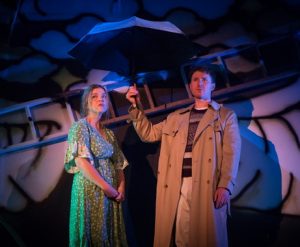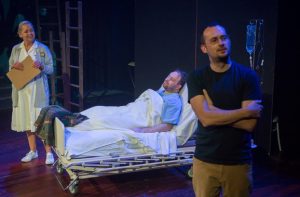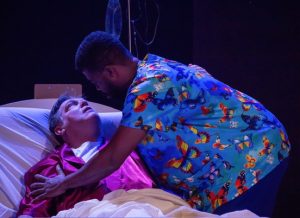Angels in America

By Tony Kushner; University of Adelaide Theatre Guild; directed by Hayley Horton – Part 1 (‘The Millennium Approaches’) 2 May 2024; Part 2 (‘Perestroika’) on 3 May 2024
The AIDS epidemic hit New York City the worst (San Francisco came second). It emerged in the early 1980s, primarily in the gay community, and became synonymous therewith, but was in no way actually so localised. Poorly understood initially by medical science, it was first tagged as Kaposi’s Sarcoma (cancerous lesions on skin, lymph nodes, mouth and other organs). Like all plagues, it caused fear, suspicion, mistrust, prejudice and panic. Lives and relationships were destroyed: human love, warmth, and touch became anathema (which has a familiar 2019-2024 ring to it).
Tony Kushner’s monumental play first appeared in the early 1990s, and already by 1994, Harold Bloom (another NY Jewish intellectual) predicted that Angels would become part of the Western literary canon. It is a remarkable but flawed piece of drama, essentially in that Kushner makes an heroic attempt to synthesize Reagan’s America through the prism of diverse and often mythological characters; its length, tendentious Brechtian declamations on ontology, and dizzying scene changes, require a blood transfusion at conclusion (pardon the pun); and it so relentlessly (but necessarily) focuses on death that it recalls Webster’s The White Devil. Also, it has more coincidences than Lantana, but here that doesn’t grate because of Kushner’s overall design, which as the full title of his play suggests, is to construct a ‘Gay Fantasia on National Themes,’ a rip on American mores during crises, suggesting the 1980s were not “Morning in America”, but the bleak dark murk of deepest night.
Summarising the scenes would take a long time. The play begins with a funeral and gets not much cheerier, Death appearing throughout, in the forms of various angels, ghosts and imaginary friends. However, much of the time, the piece is hilarious, crackling with wit, self-delusion, self-deprecation and commentary on the never-ending fraying of America. It is a theatrical piece that an acting entourage will die for. Kushner’s staging notes say: “The plays [sic] benefit from a pared-down style of presentation, with scenery kept to an evocative and informative minimum…I recommend rapid scene shifts (no blackouts!), employing the cast as well as stagehands in shifting the scene. This must be an actor-driven event…The moments of magic…are to be fully imagined and realized, as wonderful theatrical illusions—which means it’s OK if the wires show, and maybe it’s good that they do...” Here, the director has been faithful to Kushner’s admonition, with the added eerie touch of haze fx. My overall impression was that Part 1 was more effective, the resolution of various scenarios in Part 2 lacking a certain mystery.
The key figures are:
Prior Walter, young, sick, lesions showing and bleeding, difficulty walking. Scared and brave, he is magnificently played by Matthew Houston (the cast take on multiple roles);
Louis Ironson – Prior’s guilt-ridden boyfriend. Freaked-out by Prior’s disease, he flees into the arms of another and rationalises his behaviour as either courageous, or the fault of Republicans. (Beautifully played by Lee Cook);
Harper Pitt – The pill-popping Mormon housewife . She’s John on Patmos, falling back on the sharp points of her own resources after a revelation, wrestling and coming to terms with the fact that her stolid but distant husband Joe Pitt, is gay. (Standout work from Casmira Lorien);
Joe Pitt – The token conservative bloviates on ethics and faith, struggles with his sexual identity, and despite the aridity of his soul, pleads for understanding. This is a difficult character and Lindsay Prodea makes him more convincing as the story develops, when his motivations (and more) are revealed in full glory. His mixed-up world-view reminds us that New York last voted for a Republican President in 1984;
Roy Cohn – The weirdest character was in fact real, a loathsome and lethal éminence grise whose private life inverted the public one, including the concealment, bordering on denial, of his AIDS condition, which he insists is liver cancer, to preserve his reputation. His character is well drawn, albeit in grotesque caricature (and inspiringly played by Brant Eustice, showing more of Cohn’s nastiness than Nathan Lane did in the National Theatre production in London), but he feels somewhat helicoptered-in by the playwright – Cohn could fill a whole story on his own. (In mitigation of Cohn’s deserved descent to Hell, I would have had Ethel Rosenberg executed as well).
Hannah Pitt – Joe’s mother. She comes to New York after her son drunkenly comes out of the closet. She arrives to find that Joe has abandoned his wife. Kate Anolak is fine in the role and particularly good as the Rabbi, and the ghost of Ethel Rosenberg.
Belize – A former drag queen, Prior’s ex-boyfriend who remains a staunch friend. He later becomes Roy Cohn’s nurse, and the two have a marvellous fencing-duel of words. It is a vibrant performance by Eric McDowell, the only cast member who doesn’t have to affect an American accent, although the rest of the cast do fine in this regard. And the whole ensemble, in subordinate roles, is terrific.
“For an angel went down at a certain season into the pool, and troubled the water: whosoever then first after the troubling of the water stepped in was made whole of whatsoever disease he had.” [The Gospel According to St. John, 5:4]. The play concludes with Prior’s recounting of the legend of the Pool of Bethesda in Jerusalem, where the sick were healed. It ends this long work on a chord of hope, which, fortunately, has turned-out for a significant majority of HIV-sufferers to be true.
Leave a comment...
While your email address is required to post a comment, it will NOT be published.





0 Comments